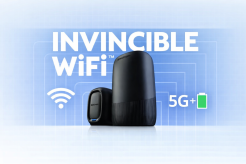Evaluating the Best Internet Service Options

Choosing the right internet service is crucial in today's connected world. With so many options available, it can be challenging to determine which one best suits your needs. This article aims to help you evaluate the best internet service options by exploring the different types of connections, factors to consider, and top providers. Whether you're streaming movies, gaming, working from home, or simply browsing the web, finding the right internet service can make all the difference.
Types of Internet Connections
When evaluating internet service options, it's essential to understand the different types of connections available:
DSL
Digital Subscriber Line (DSL) uses telephone lines to deliver internet service. It's widely available and often more affordable, but it may not offer the high speeds of other options.
Cable
Cable internet uses the same coaxial cables as cable TV. It provides faster speeds than DSL and is widely available in urban and suburban areas.
Fiber-optic
Fiber-optic internet uses light signals to transmit data through glass fibers. It offers the fastest speeds and highest reliability but is less widely available, often limited to urban areas.
Satellite
Satellite internet is available almost anywhere, making it ideal for rural areas. However, it tends to have higher latency and lower speeds compared to other types.
Fixed Wireless
Fixed wireless delivers internet service using radio signals from a local tower. It's a good option for rural areas without wired infrastructure but may be affected by weather and obstacles.
Factors to Consider When Choosing an Internet Service
Choosing the right internet service involves considering several factors:
Speed Requirements
Different activities require different speeds. Streaming, gaming, and remote work all have varying speed needs. Assess your household's usage to determine the appropriate speed.
Availability in Your Area
Not all internet types or providers are available everywhere. Check which providers offer service in your area.
Cost and Budget
Internet service costs can vary widely. Consider monthly rates, installation fees, and equipment costs. Look for promotional offers and discounts.
Customer Service and Reliability
Reliable service and good customer support are crucial. Research provider reviews and ratings to gauge customer satisfaction.
Data Caps and Usage Limits
Some providers impose data caps, which can limit your usage. Unlimited data plans might be preferable for heavy users.
Top Internet Service Providers
Several providers stand out for their offerings and reliability:
Comcast Xfinity
Xfinity offers a wide range of plans with varying speeds. Known for its extensive coverage and reliable service, it is a top choice for many households.
AT&T Internet
AT&T provides DSL and fiber-optic options. Its fiber service, AT&T Fiber, is known for high speeds and reliability.
Verizon Fios
Verizon Fios offers fiber-optic internet with impressive speeds and reliability. It's available in select areas but is highly rated by its users.
Spectrum
Spectrum provides cable internet with no data caps, making it a popular choice for households with high data usage.
CenturyLink
CenturyLink offers both DSL and fiber options. It's known for its straightforward pricing and no-contract plans.
Comparing Internet Speeds
Understanding internet speeds is key to choosing the right plan:
Download vs. Upload Speeds
Download speeds affect activities like streaming and browsing, while upload speeds impact video calls and uploading files.
Understanding Mbps and Gbps
Internet speeds are measured in megabits per second (Mbps) or gigabits per second (Gbps). Higher numbers indicate faster speeds.
Speed Requirements for Different Activities
Streaming HD video typically requires at least 5 Mbps, while 4K streaming and online gaming may need 25 Mbps or more. Remote work can require higher upload speeds for video conferencing.
Cost and Value
Evaluating the cost and value of internet service involves several considerations:
Comparing Monthly Rates
Look at the monthly rates for different plans and providers. Consider what you get for the price, including speed and data limits.
Installation and Equipment Fees
Some providers charge for installation and equipment, while others include it in the monthly rate. Be sure to factor these costs into your decision.
Promotional Offers and Discounts
Many providers offer promotional rates for new customers. Check the duration of these offers and the regular rate after the promotion ends.
Evaluating Value for Money
Consider the overall value, not just the cost. A slightly more expensive plan with better speeds and reliability may offer better value.
Availability and Coverage
Internet availability varies by location:
Urban vs. Rural Availability
Urban areas typically have more options and higher speeds, while rural areas may be limited to satellite or fixed wireless.
Checking Provider Coverage Maps
Most providers have online tools to check availability based on your address. Use these tools to see which options are available.
Alternatives for Underserved Areas
If you're in an underserved area, consider satellite or fixed wireless as alternatives to traditional wired services.
Customer Service and Support
Good customer service is essential for resolving issues:
Importance of Good Customer Service
Reliable customer service ensures any issues are promptly addressed, minimizing downtime and frustration.
Reviews and Ratings of Customer Support
Check reviews and ratings for customer support. Providers with high satisfaction scores are likely to offer better service.
How to Assess Customer Service Quality
Look for indicators such as 24/7 support, multiple contact methods (phone, chat, email), and positive customer feedback.
Contracts and Flexibility
Consider the terms and flexibility of the service plans:
Long-term Contracts vs. No-contract Options
Some providers require long-term contracts, while others offer no-contract plans. No-contract plans provide more flexibility.
Early Termination Fees
Be aware of early termination fees if you cancel a contract early. This can be a significant cost if you decide to switch providers.
Flexibility in Upgrading or Downgrading Plans
Check if you can easily upgrade or downgrade your plan as your needs change without incurring penalties.
Data Caps and Unlimited Plans
Understanding data limits is crucial:
Understanding Data Caps
Some providers limit the amount of data you can use each month. Exceeding these caps can result in extra charges or throttled speeds.
Pros and Cons of Unlimited Data Plans
Unlimited data plans offer peace of mind but may come at a higher cost. Consider your usage patterns to determine if it's worth it.
How to Monitor Data Usage
Use tools provided by your ISP to monitor your data usage. This helps avoid unexpected charges or throttled speeds.
Installation and Setup
Setting up your internet service can vary:
Professional Installation vs. Self-installation
Some providers offer professional installation, while others provide self-installation kits. Professional installation ensures everything is set up correctly but may come with an extra cost.
Installation Fees and Equipment Costs
Check if there are installation fees and the cost of equipment like modems and routers. Some providers include these in the service cost.
Setup Time and Process
Consider the setup time and process. Professional installation may take longer to schedule but is often quicker and more reliable than self-installation.
Bundling Options
Bundling services can save money and simplify billing:
Bundling Internet with TV and Phone Services
Many providers offer bundles that include internet, TV, and phone services. Bundles can offer savings and convenience.
Benefits and Drawbacks of Bundles
Bundling can reduce costs but may include services you don't need. Ensure the bundle meets your needs without unnecessary extras.
How to Find the Best Bundle Deals
Compare bundles from different providers, looking for the best combination of services and price. Promotional bundles often offer significant savings.
Security and Privacy
A secure and private internet connection is vital:
Importance of Secure Internet Connections
Protecting your data and devices from threats is crucial. Choose a provider that offers robust security features.
Provider Security Features
Look for providers that offer features like firewalls, anti-virus software, and secure Wi-Fi connections.
Privacy Policies and Data Protection
Review the provider's privacy policy to understand how your data is used and protected. Choose a provider committed to protecting your privacy.
Evaluating Your Needs
Tailoring your internet service to your needs ensures satisfaction:
Assessing Your Household's Internet Usage
Consider the number of users and devices in your household. Higher usage requires faster speeds and more data.
Matching Internet Plans to Your Needs
Choose a plan that meets your speed and data requirements. Avoid overpaying for features you don't need.
Future-proofing Your Internet Connection
Consider future needs, such as additional devices or increased usage. Choosing a plan that can scale with your needs prevents frequent changes.
Conclusion
Selecting the best internet service involves evaluating various factors, from speed and cost to customer service and security. By understanding your needs and researching your options, you can find a provider that offers the best value and performance. Whether you prioritize speed, reliability, or affordability, the right internet service can enhance your online experience and keep you connected.
Related Posts
 Internet Bundles
Internet Bundles
Facts About Youtube That May Surprise You
Discover updated YouTube facts, user statistics, revenue insights, and video trends shaping global content consumption and digital marketing strategies today.
 Internet Bundles
Broadband Installation
cheap internet deals
Internet Bundles
Broadband Installation
cheap internet deals
Simple Steps to Self-Install Spectrum Internet Fast: 2026 Guide
Learn how to self-install Spectrum Internet step-by-step. Save installation fees, activate service fast, and optimize WiFi performance with this complete guide.
 Internet Bundles
Internet Bundles
Why High-Speed Business Internet Matters More Than Ever
Discover why high-speed business internet drives productivity, security, and revenue growth, and how to choose the right provider for long-term success.
 Wifi
Technology
Wifi
Technology
Spectrum INVINCIBLE WiFi: Stay Connected During Outages
Discover how Spectrum INVINCIBLE WiFi combines WiFi 7, 5G backup, and battery protection to keep your home internet running during outages and disruptions.
 Internet Bundles
Broadband Deals
Internet Bundles
Broadband Deals
Best High-Speed Internet Plans for 2026
Discover the fastest high-speed internet plans. Compare fiber and cable options, speeds, and pricing to find the perfect plan for your home or business.